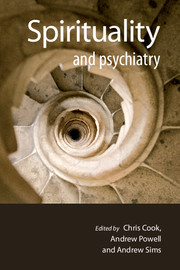Book contents
- Frontmatter
- Contents
- List of contributors
- List of tables, boxes and figures
- Foreword
- Preface
- The Spirituality and Psychiatry Special Interest Group of the Royal College of Psychiatrists
- 1 Spirituality in psychiatry
- 2 Assessing spiritual needs
- 3 Psychosis
- 4 Suicide
- 5 Child and adolescent psychiatry
- 6 Psychotherapy
- 7 Intellectual disability
- 8 Substance misuse
- 9 Neuroscience of the spirit
- 10 Spiritual care in the NHS
- 11 The transpersonal perspective
- 12 Religion and religious experiences
- 13 Pathological spirituality
- 14 Ageing
- Index
12 - Religion and religious experiences
Published online by Cambridge University Press: 02 January 2018
- Frontmatter
- Contents
- List of contributors
- List of tables, boxes and figures
- Foreword
- Preface
- The Spirituality and Psychiatry Special Interest Group of the Royal College of Psychiatrists
- 1 Spirituality in psychiatry
- 2 Assessing spiritual needs
- 3 Psychosis
- 4 Suicide
- 5 Child and adolescent psychiatry
- 6 Psychotherapy
- 7 Intellectual disability
- 8 Substance misuse
- 9 Neuroscience of the spirit
- 10 Spiritual care in the NHS
- 11 The transpersonal perspective
- 12 Religion and religious experiences
- 13 Pathological spirituality
- 14 Ageing
- Index
Summary
In this chapter we aim to show how religious beliefs relate to the wider concept of spirituality and to the practice of psychiatry. We concur with the definition of spirituality given in chapter 1, where it was stated that for the purpose of this book ‘it might be helpful to emphasise that religion is concerned with socially and traditionally shared beliefs and experience’ (p. 4).
Spirituality comprises a major part of religious tradition and practice, along with doctrine, scripture, ritual and worship. Within the broad spiritual tradition of each religion, there is the personal and unique spirituality of each adherent. Yet there is also the possibility of someone being religious in name only, as when someone has been raised in a religious community, but rejects its spiritual component. We are distinguishing here between intrinsic religiosity, which implies taking the teachings of religion seriously, and extrinsic religiosity that involves a ‘selfish and instrumental’ use of religion (Hunt & King, 1972). Batson et al (1993) suggested a positive relationship between intrinsic religiosity and a number of measures of mental health, while extrinsic religiosity related to poor mental health.
We wish to see an open-mindedness in mental healthcare that enables the acquisition of a wider knowledge base through learning from the experiences brought by our patients – the best possible way to gain confidence and skills. We will identify the often under-used resources for this work within the health service in relation to multidisciplinary teams, provisions for chaplaincy and spiritual care departments, and with religious organisations in the community at large. We will look at how service outreach can be supported, using religious buildings as less stigmatising and more user-friendly places for care and treatment.
Psychiatrists should know about the world views held by their patients, as they affect decision-making in health and illness; religious concepts and experiences contribute importantly to such world views. For example, knowing the religious affiliation of a person with a suicidal intent, including his or her concept of the afterlife, can help the psychiatrist evaluate risk (Hassan, 1983; Mahy, 1993). However, mental health professionals have only limited time to engage with and understand the religious beliefs of their patients when faced with the increasingly complex ideas, practices and traditions of the many faiths in our growingly multicultural societies.
- Type
- Chapter
- Information
- Spirituality and Psychiatry , pp. 233 - 253Publisher: Royal College of PsychiatristsPrint publication year: 2009



